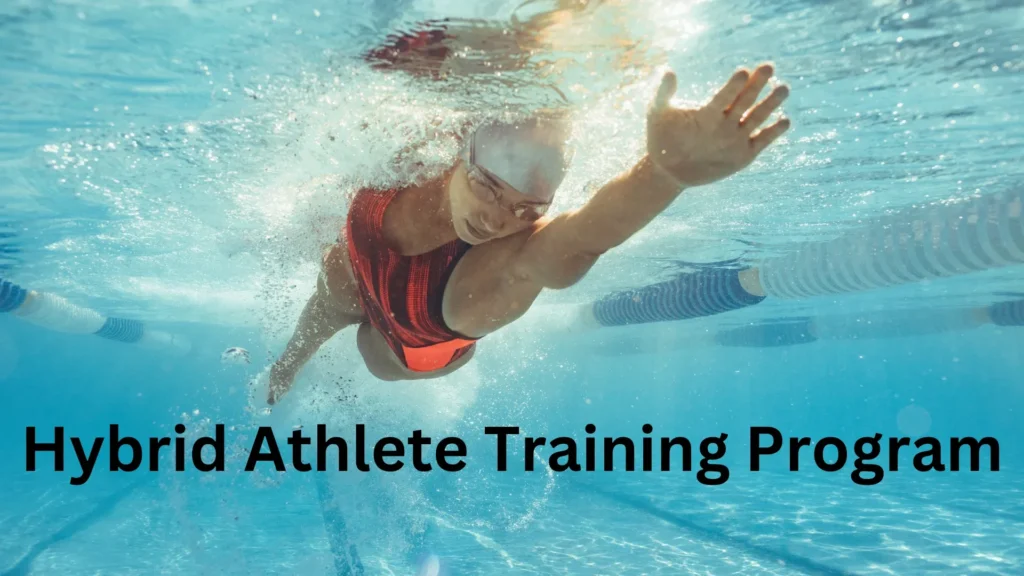
Hybrid athlete training programs are on the rise.
These programs combine different sports disciplines into one training regimen.
They require physical strength, endurance, and agility.
But, the psychological aspect is equally important.
Let’s dive into how the mind plays a crucial role in hybrid athlete training.
You see, in the world of sports, physical prowess often takes centre stage.
However, the mind’s power cannot be underestimated.
The psychological aspects of training can make or break an athlete.
Mental preparation, focus, and resilience are just as crucial as physical training.
Hybrid athlete training programs recognize this balance.
They emphasize the importance of a strong mental game.
The Success Stories Community is a shining example of this approach.
This community supports hybrid athletes by focusing on both physical and mental training.
Members share their experiences and learn from each other.
The community also fosters a sense of belonging and motivation.
This dual focus on physical and psychological training sets hybrid athletes up for success.
Understanding Hybrid Athlete Training
So, what exactly is hybrid athlete training?
It blends various types of exercises.
Think triathletes who swim, bike, and run.
Or CrossFit athletes who lift, run, and perform high-intensity workouts.
These athletes benefit from a diverse training routine.
They gain versatility, enhanced fitness, and reduced risk of injury.
Hybrid athlete training involves integrating multiple forms of exercise into one cohesive program.
This approach not only enhances physical capabilities but also builds a well-rounded athletic profile.
Athletes engage in endurance sports like running or cycling, strength training, and flexibility workouts such as yoga or pilates.
This multifaceted approach develops a broad range of skills and physical attributes.
Examples of Hybrid Athletes
Consider the triathlete.
They are the epitome of a hybrid athlete.
They must master swimming, cycling, and running.
Each discipline demands different skills and muscle groups.
The training is intense but rewarding.
CrossFit athletes are another great example.
They engage in a variety of exercises, from weightlifting to high-intensity interval training (HIIT).
This diversity makes them incredibly versatile and resilient.
Benefits of Hybrid Training
Hybrid athlete training programs offer numerous benefits.
First, they enhance overall fitness.
By incorporating different types of workouts, athletes build strength, endurance, and flexibility.
This comprehensive fitness helps prevent injuries.
Diverse workouts target different muscle groups, reducing the risk of overuse injuries.
Moreover, hybrid training keeps workouts exciting.
The variety prevents boredom and keeps athletes motivated. It also promotes balanced muscle development.
For instance, a runner might have strong legs but a weaker upper body.
Adding weightlifting to their routine balances their physique.
Hybrid training also fosters adaptability.
Athletes learn to switch between different types of activities quickly.
This adaptability is beneficial not just in sports but in everyday life.
The ability to handle various physical challenges builds confidence and resilience.

Psychological Benefits of Hybrid Training
Mental toughness is key in hybrid athlete training programs.
The variety of activities builds resilience, particularly as you are challenged to perform movements or tasks that you are not as skilled at.
Hybrid training also boosts focus and cognitive function.
Athletes need to switch between different activities.
This keeps the mind sharp.
Plus, the mix of workouts helps reduce stress.
Regular exercise is great for mental health.
Mental Toughness and Resilience
The diverse nature of hybrid athlete training programs forces athletes to face and overcome various challenges.
Each sport within the program presents its own set of difficulties, requiring adaptability and perseverance.
This constant adaptation fosters mental toughness.
Athletes learn to push through discomfort and fatigue, building resilience.
This mental toughness is not just valuable in sports but also in everyday life, helping athletes tackle personal and professional challenges with a stronger mindset.
Improved Focus and Cognitive Function
Engaging in multiple sports disciplines enhances cognitive function.
Switching between different types of exercises requires mental agility and quick decision-making.
This cross-training effect improves overall brain function.
Studies have shown that physical exercise boosts brain health, leading to better focus, memory, and problem-solving skills.
For hybrid athletes, this means improved performance in training and competition.
The constant mental engagement required by hybrid training keeps the brain sharp and alert.
Stress Reduction and Mental Health Benefits
Hybrid athlete training programs offer significant mental health benefits.
The varied nature of the workouts helps to prevent monotony and burnout.
Regular exercise is known to release endorphins, which are natural mood lifters.
Engaging in different sports can also provide a sense of accomplishment and progress, enhancing self-esteem.
The physical exertion involved in hybrid training acts as a natural stress reliever, helping athletes manage anxiety and depression.
Additionally, being part of a supportive community, like the Success Stories Community, provides social support and reduces feelings of isolation.
Enhanced Emotional Regulation
Participating in a hybrid athlete training program can significantly enhance emotional regulation.
The blend of different exercises teaches athletes to manage their emotions effectively.
For example, the patience required in long-distance running can help athletes stay calm during high-pressure situations in other sports.
The focus needed in weightlifting can translate into better concentration during stressful events.
This improved emotional regulation contributes to overall mental well-being and better performance under pressure.
Increased Confidence and Self-Efficacy
Hybrid athlete training programs build confidence and self-efficacy.
Mastering multiple sports disciplines gives athletes a sense of achievement and competence.
This confidence translates into other areas of life.
Overcoming physical challenges boosts self-belief, encouraging athletes to take on new challenges and push their limits.
This increased self-efficacy is a powerful motivator, driving athletes to set and achieve higher goals.
Key Psychological Strategies for Hybrid Athletes
Goal Setting and Motivation
Setting clear goals is vital.
Break them down into manageable steps.
This keeps motivation high.
Make sure goals are SMART (Specific, Measurable, Achievable, Relevant, Time-bound).
This approach provides clear direction and a sense of accomplishment as each milestone is reached.
Visualization Techniques
Picture success in your mind.
Visualize completing each workout.
See yourself achieving your goals.
Visualization can improve performance by mentally rehearsing the desired outcome.
This technique helps in building confidence and preparing the mind for actual performance scenarios.
Mindfulness and Meditation Practices
Stay present during training.
Use mindfulness to focus on each movement.
Meditation can calm the mind before a big event.
Practicing mindfulness can reduce anxiety and improve concentration.
It helps athletes stay grounded and focused, enhancing overall performance.
Stress Management Strategies
Stress is inevitable. Learn to manage it.
Deep breathing exercises and relaxation techniques can help.
Techniques such as progressive muscle relaxation, yoga, and even regular stretching can reduce physical and mental tension.
Managing stress effectively ensures that it does not negatively impact performance.
Positive Self-Talk
Encourage yourself with positive affirmations.
Replace negative thoughts with empowering ones.
Positive self-talk can boost confidence and help maintain motivation.
It creates a positive mental environment conducive to high performance.
Routine Building
Establishing a consistent routine can provide structure and stability.
A well-structured routine helps in managing time effectively, ensuring that all aspects of training are covered without overwhelming the athlete.
It creates a sense of normalcy and predictability, which can be calming and motivating.
Rest and Recovery
Ensure you allocate time for rest and recovery.
Overtraining can lead to burnout and injuries.
Adequate sleep, nutrition, and relaxation are crucial for maintaining physical and mental health.
Rest and recovery are integral parts of any successful training program.
How To Create Your Own Hybrid Athlete Training Program
First, establish clear, SMART goals (Specific, Measurable, Achievable, Relevant, Time-bound) to provide direction and motivation, ensuring each milestone brings a sense of accomplishment.
Incorporate a variety of exercises to prevent monotony and enhance cognitive flexibility, ensuring that each workout challenges different muscle groups and mental skills.
Prioritize mindfulness and meditation practices to maintain focus and reduce stress, fostering a calm and present mindset during training.
Employ visualization techniques to mentally rehearse success, boosting confidence and preparedness by imagining the completion of each exercise and the achievement of goals.
Additionally, positive self-talk can reinforce a resilient mindset, replacing negative thoughts with empowering affirmations.
Build a balanced routine that includes adequate rest and recovery, preventing burnout and allowing both the body and mind to rejuvenate.
This includes getting enough sleep, proper nutrition, and incorporating relaxation techniques.
Finally, stress management strategies such as deep breathing exercises and progressive muscle relaxation should be integral parts of the program to ensure that stress does not negatively impact performance.
By integrating these principles, athletes can achieve a well-rounded and sustainable hybrid training regimen, enhancing both their physical capabilities and mental resilience.

Example of a Hybrid Athlete Training Program Week
*This is just an example, not a prescription. Before beginning any exercise program or changing your physical activity patterns, you should consult with your doctor or physician, particularly if you have been inactive, are very overweight, or have or suspect any sort of medical condition that might be worsened by exercise.
Week 1 Hybrid Training Plan
Day 1: Monday
Morning:
– 30-minute tempo run
– 20 minutes of dynamic stretching
Afternoon:
– Strength training: Upper body focus (45 minutes)
– Bench press, pull-ups, dumbbell rows, shoulder press
– 3 sets of 8-12 reps
Day 2: Tuesday
Morning:
– HIIT workout (30 minutes)
– 10 exercises, 45 seconds on, 15 seconds off
Afternoon:
– Yoga session (30 minutes)
Day 3: Wednesday
Morning:
– Long swim (45 minutes)
Afternoon:
– Core workout (20 minutes)
– Planks, Russian twists, bicycle crunches
– 3 sets of 15-20 reps
Day 4: Thursday
Morning:
– Interval run (30 minutes)
– 5-minute warm-up, 1-minute sprint, 2-minute walk/jog, repeat 10 times
Afternoon:
– Strength training: Lower body focus (45 minutes)
– Squats, deadlifts, lunges, calf raises
– 3 sets of 8-12 reps
Day 5: Friday
Morning:
– Cycling session (45 minutes)
Afternoon:
– Stretching and foam rolling (20 minutes)
Day 6: Saturday
Morning:
– Cross-training (45 minutes)
– Rowing, jump rope, bodyweight exercises
Afternoon:
– Light activity or rest
Day 7: Sunday
Morning:
– Rest day or active recovery
– Gentle yoga or stretching (30 minutes)
Afternoon:
– Mental recovery: Meditation or mindfulness session (20 minutes)
Or Download/Print the below schedule ⬇️

Tailored Help for Success Stories Community Members
The Success Stories Community offers personalized support.
Focus on the mental and emotional skills that will yield your greatest improvements.
You can also access exclusive webinars and workshops.
Community support is also a big plus.
Connect with others who share your goals.
Share success stories and find inspiration.
Conclusion
Psychological strategies are crucial in a hybrid athlete training program.
They boost performance and mental health.
If you’re serious about your training, join the Success Stories Community.
Get tailored help and support.
Achieve your goals with a strong mind and body.
Ready to take your hybrid athlete training program to the next level?
Join the Success Stories Community today!



